Xu Zhangrun vs. Tsinghua University
Former People, Бывшие люди (Byvshiye lyudi), is the title of a novella by Maxim Gorky published in 1897. Known in English translation as Creatures That Once Were Men, Gorky’s story would inspire the Bolsheviks to employ the term ‘Former People’ when speaking about survivors of the defunct ancien regime. Their number included members of the aristocracy, the clergy, the Tsarist military and bureaucracy. As individuals whom the progress of history had cast aside, Former People were treated as ‘has-beens’ in every regard.
I had the good fortune to be befriended by a number of China’s Former People from just after the death of Mao Zedong in late 1976. As many of those men and women were gradually recognised as now being members of ‘The People’ during the early post-Mao years, I would also come to know others who were well on the way to joining the ranks of a whole new category of China’s Former People.
***
As I noted in 1987, despite their pursuit of Economic Reform Policies and Openness to the World, the Chinese Communists never intended to abandon, or even seriously reform, the repressive mechanisms of the state that had shored up their power over the decades. In fact, the proliferation of Chinese Former People, that is men and women of conscience who were consigned to the party-state’s memory hole, has been an ineluctable fact from the time of the arrest of Wei Jingsheng 魏京生 in early 1979 and the bulldozing of the Xidan Democracy Wall in Beijing not long after.
Then, with the purge of Party General Secretary Hu Yaobang in January 1987 (see ‘Memory Holes, Old & New’), the post-Mao intellectual and cultural landscape has been increasingly scarred by the vestigial presence of ‘China’s Former People’.
As I observed in October 2018:
Under Xi Jinping, head of the party-state-army of China’s People’s Republic, the country’s memory hole industry has enjoyed a new boom. It is an enterprise devoted to the obliteration of the images, memories and works of individuals deemed to be persona non grata. China’s memory holes are generously engineered to disappear ideas, events and even discomfiting eras. They gobble up dissidents and their writings; they also devour the enemies within, men and women purged for real or concocted crimes against the Party. Moreover, from 2017, the international academic industry also learned that some of their publishers were collaborating in the memory hole industry by deleting research work that was displeasing to the Communist authorities from the online journals and books that they ‘sold into’ the mainland Chinese market (see ‘Burn the Books, Bury the Scholars!’, China Heritage, 22 August 2017).
Under Mao, the most common term for ‘former people with Chinese characteristics’ was ‘The Five Black Categories of People’ 黑五類. These were:
- Landlords 地主;
- Rich Farmers 富農;
- Counter-revolutionaries 反革命;
- Bad Elements 壞份子; and,
- Rightists 右派.
In 1989, the maw of the state disappeared so many people and events that some writers would speculate that surely the country was suffering from a form of collective amnesia. While the names of some student activists, leading intellectuals and a few workers are known, the vast number of 1989 Former People — those killed, jailed or punished in various ways over the years — are rarely known and not acknowledged publicly.
The writers and activists Dai Qing 戴晴 and Liu Xiaobo 劉曉波 were involved in the mass protest movement of April-June 1989. At the time, both were prominent public figures and prolific authors who were at the height of their fame and influence. In the wake of the 4th of June Beijing Massacre, both were jailed. Even though they were eventually released, thereafter their formerly vibrant careers were obliterated (their works, however, continue to be published in Hong Kong and Taiwan). For their audiences in the People’s Republic, however, they were for all intents and purposes no better than Former People, or non-entities. As Dai Qing said to me in late 1990:
‘Well, they may have let me out of a small jail, but in reality I’m still in the vast jail that is China.’
***
Xu Zhangrun 許章潤, an outspoken critic of the Xi Jinping government, was detained on Monday the 6th of July 2020 at his apartment in the western suburbs of Beijing. He was released after six days without any formal charge being laid on Sunday the 12th of July. Ever since publishing ‘Imminent Fears, Immediate Hopes’ 我們當下的恐懼與期待, a breathtaking jeremiad, in late July 2018, he has been China’s most recalcitrant Former Person. In late October, unbowed by pressure from his employer Tsinghua University to remain silent, he wrote:
In the normal course of events, it is commonplace for bookish scholars to give voice to their political views, and for those without political ambition to express all kinds of [arrant] opinion. It is simply par for the course; nothing more than jus natural — a natural right. But living as one does in a period of political irregularity during what is a momentous era of transformation, it was but inevitable that my writing was broadcast widely on the Internet, thereby offending against the taboos of the autocrats and causing discomfort to the hardened carapace of the totalitarians. … Eyes wide open I was fully aware of what I was doing and psychologically prepared for anything untoward that might befall me. That’s why I was not particularly perturbed by the initial wave of ‘gentle breezes and mild rains’ that consisted of the elimination of online material related to me and the blocking of my name. At first, I simply took no notice; moreover, it did not disturb me unduly. The wondrously efficacious methods of the age-old Qin tyranny are now but shabby techniques employed by the Newly Ennobled One. Although separated by two millennia, and despite variations on the theme, there has been no significant evolution [in how autocratic Qin-era methods are being imposed on today’s reality]. All in all, it comes down to the same old thing: ‘make people keep their mouths shut’. So what is happening to me is hardly a surprise!
— from Xu Zhangrun, ‘And Teachers, Then? They Just Do Their Thing!’
China Heritage, 10 November 2018
But Xu Zhangrun refused to keep his mouth shut.
In the vaunted ‘New Epoch’ of Xi Jinping, the five main problematic social groups, or ‘black categories’, are rights lawyers, underground religious activists, dissidents, Internet leaders (influencers), as well as various vulnerable groups. Perhaps ‘Upright Professors and Outspoken Educators’ will become another category in the country’s ever-expanding register of Former People.
***
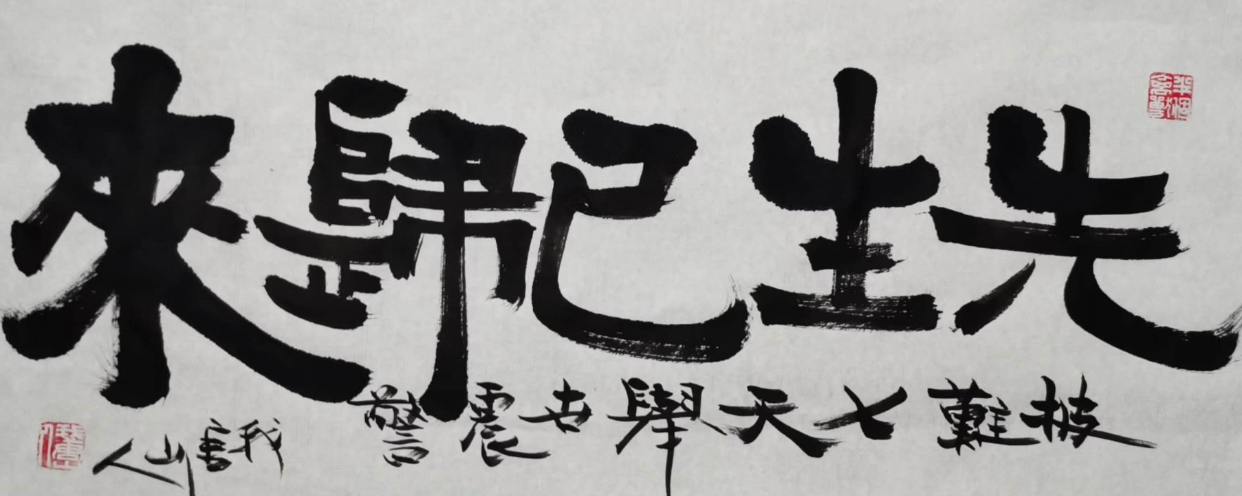
***
Our series ‘Viral Alarm’ — which is also the theme of China Heritage Annual 2020 — is inspired by ‘When Fury Overcomes Fear’, an essay by Xu Zhangrun related to the coronavirus and China’s ongoing leadership crisis.
As ever, I am grateful to Reader #1 for his timely suggestions and corrections. He also reminded me of a saying cum-prophecy current around half a century ago:
‘It will someday be recorded in footnotes that in the Age of Sakharov there lived and ruled for a time the minor politician Leonid Brezhnev.’
***
Note: All translations are mine, unless otherwise indicated.
— Geremie R. Barmé
Editor, China Heritage
13 July 2020
劉曉波祭日
The Third Anniversary of Liu Xiaobo’s Death
***
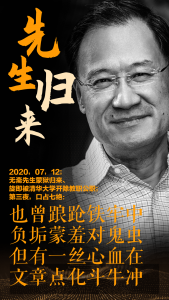
On 14 July 2020, a message was circulated on the Chinese Internet containing a poem written by Xu Zhangrun:
‘On 12 July, the Master of Erewhon Studio returned. Thereupon, Tsinghua University stripped him of his job and cancelled his professional ranking. On the third night of his release [the 14th of July], out came an impromptu verse:
Stumbling thence into their clutches, imprisoned,
Reputation befouled, vile minions still besmirch.
So long as blood yet courses through these veins,
Revelatory essays surge forth, energy undiminished.
也曾踉蹌鐵牢中
負垢蒙羞對鬼蟲
但有一絲心血在
文章點化斗牛衝
(The expression 斗牛 dǒu niú in the last line refers to the constellations 斗宿 dǒu xiù (Dipper) and 牛宿 niú xiù (Ox), two mansions or lodges in the northern Dark Warrior 玄武 quadrant of the sky, one that relates to protection and longevity.)
***
Count Alexander Ilyich Rostov is the protagonist of A Gentleman in Moscow, a novel by Amor Towles published in 2016. The action of the book starts with a session of the ‘Emergency Committee of the People’s Commissariat for Internal Affairs’ convened on 21 June 1922. Following a short interrogation, the commissars tell the Count that:
‘… our inclination would be to have you taken from this chamber and put against the wall.’
But there are ‘those within the senior ranks of the Party’ who remember Rostov for having written a powerful poem attacking the autocratic old regime. They therefore regard him as something of a pre-revolutionary hero. In recognition of that contribution Rostov is granted leave to return to the Metropol Hotel, where he has been residing since 5 September 1918. ‘But make no mistake’, the commissars warn:
‘should you ever set foot outside of the Metropol again, you will be shot.’
In the blink of an eye, Count Rostov has become a Former Person.
— Amor Towles, A Gentleman in Moscow
New York: Viking, 2016
***
Related Material:
- ‘The Pity of It’, China Heritage, 13 July 2017
- Xu Zhangrun 許章潤, ‘In Memoriam — Shrouds of Ice on a River Incarnadine’, China Heritage, 4 June 2020
- The Editor, ‘無可奈何 — So It Goes’, China Heritage, 6 July 2020
- Xu Zhangrun 許章潤, ‘I Will Not Submit, I Will Not Be Cowed’, China Heritage, 10 October 2019
- Xu Zhangrun 許章潤, ‘Abiding Until Daybreak’, China Heritage, 30 September 2019
- Various, ‘A Writer’s Desk & the Vastness of China — 1989, 2019’, China Heritage, 4 June 2019
- The Xu Zhangrun 許章潤 Archive, China Heritage, 1 August 2018-
- G.K. Chesterton, ‘Introduction to Creatures That Once Were Men’
Media Reports:
- Chris Buckley, ‘Seized by the Police, an Outspoken Chinese Professor Sees Fears Come True’, The New York Times, 6 July 2020
- Chris Buckley, ‘Outspoken Chinese Professor Is Said to Be Released From Detention’, The New York Times, 12 July 2020
- Gao Feng, ‘China’s Tsinghua University Fires Outspoken Lecturer Xu Zhangrun’, translated and edited by Luisetta Mudie, Radio Free Asia, 14 July 2020
- Josephine Ma and Guo Rui, , South China Morning Post, 18 July 2020
- ‘清華大學向許章潤發出開除處分文件 稱其違反教師行為準則’, 《自由亞洲電台》, 2020年7月18日
Commentary:
- 白信, ‘自由主義的哀歌 清華大學與北京「最後一個士大夫」脫鈎’, 《德國之聲》,2020年7月15日
- 時事大家談, ‘專訪林培瑞和黎安友:美中關係為何在習時代翻船?’,《美國之音》,2020年7月15日
- 時事小品, ‘隔空嫖娼’,《新唐電視》, 2020年7月20日

***
What the Fate of Xu Zhangrun
Means for Thinking China
Geremie R. Barmé
‘Enough already of your odious deification and the vacuous new personality cult,’ 够了,这发霉的造神运动、淺薄的领袖崇拜 wrote Xu Zhangrun, China’s most famous critic of Xi Jinping and his authoritarian rule, who was detained at his apartment in the western suburbs of Beijing on Monday 6 July 2020. Writing in the powerful style for which he has become famous — one that melds classical turns of phrase and biting humour to create a powerful form of polemic — Xu continued:
‘Enough of the shameless hosannahs lauding peace and prosperity that serve only to cloak a corrupt reality.
‘Enough of the choking lies and the boundless suffering that they conceal, and enough of this blood-thirsty Red Dynasty and its rapacious party-state.
‘Enough, I say: over the past seven years [the period Xi Jinping has been in office] we’ve had a bellyful of your absurd policies and the relentless march into the past.
‘Enough, too, of the seven long decades in which you have piled up mountains of corpses and shed blood enough to fill a sea. Yours is the handiwork of a tyranny the likes of which the world has rarely seen.’
够了,这无耻的歌舞升平、肮脏的鲜廉寡耻;够了,这骁骁漫天谎言、无边无尽的苦难;夠了,这嗜血的红朝政治、贪得无厌的党国体制;够了,这七年来的荒唐错乱、一步步的倒行逆施;够了,这七十年的尸山血海、亙古罕見的红色暴政……
These are the closing lines of ‘China, a Lone Ship of State on the Vast Ocean of Global Civilisation’, an essay Xu published on 21 May. It was the latest in a series of lengthy critiques of that country’s ongoing political crisis that Xu began three years ago. Friends in Beijing speculate that one of the reasons for his sudden detention was that he had just released a collection of those fiery essays with a small independent Chinese publishing house in New York — originally slated to appear in May through Hong Kong City University Press, that publisher had been pressured by authorities to drop the project. Instead, Bouden House 博登書屋 produced it under the Chinese title《戊戌六章》, literally, ‘Six Chapters from the Wuxu Year’, the English title is China’s Ongoing Crisis — Six Chapters from the Wuxu Year of the Dog (for details of this book, and for the introduction and table of contents, see ‘Six Chapters — One Hundred and Twenty Years’, China Heritage, 1 January 2020). He released the book in direct contravention of direct orders from his employer, Tsinghua University, which some call ‘China’s MIT’.
For years, Xu Zhangrun had warned of the invasive presence of Communist Party ideology on his campus, and in his increasingly incensed writings he identified the autocratic rule of Xi Jinping — the man he lambasts as ‘The Axelrod’ 當軸 — as the culprit in chief. I translated his most famous critique of the Xi Jinping era — ‘Imminent Fears, Immediate Hopes’ — which appeared in late July 2018 and, on the eve of his detention on 6 July, Xu told me that he was preparing a new essay to commemorate that landmark work.
For his continued defiance, Tsinghua had suspended Xu from his job as a professor in its law faculty in March last year. He was also banned from contact with students and his income was drastically reduced. The university also forbade him from speaking to the media, writing, engaging in research or publishing any work. They also placed him under formal investigation for writing and lecturing on topics that contravened an infamous 2012/2013 secretive directive known as ‘Document Number Nine’. Circulated to the Communist Party committees that control China’s universities, the document banned a host of topics related to potentially destabilising ‘Western values’ including human rights, media freedom, judicial independence and constitutionalism.
Xu was undaunted and, as we noted in the introduction to this essay, he continued to speak out:
‘It is commonplace for bookish scholars to give voice to their political views, and for those without political ambition to express all kinds of opinion. It is simply par for the course; nothing more than jus natural — a natural right. … Eyes wide open I was fully aware of what I was doing and psychologically prepared for anything untoward that might befall me. … It comes down to the same old thing: ‘make people keep their mouths shut.’ So what is happening to me is hardly a surprise!’
During his period in custody Tsinghua University rushed through a final determination on his status and, on the second day of his incarceration a delegation from the university personnel department visited him to read out an administrative sentence adjudged on the spurious basis of ‘moral turpitude’ 道德敗壞: he was stripped of his job; his professional status as a professor was invalidated; his pension was taken away; and, health coverage was withdrawn. In the event, Professor Xu was freed a few days later and, according to friends, he therefore speculated that his detention was merely a trial run. (He received a hard copy of Tsinghua’s ‘letter of cancellation’ dated 15 July 2020 delivered by courier following his release.) It seemed possible that the authorities, taken aback by the furore both in China and overseas resulting from his sudden disappearance, had thought better of their precipitate action. Now they had withdrawn to regroup; their next gambit could well be both more decisive, and final.
Xu Zhangrun’s situation reflects the broader fate of intellectual and political life in China today. But, as Xu himself observed, quoting a famous saying: ‘It’s easier to dam a river than to silence people.’ 防民之口 , 甚於防川.
Following his suspension by Tsinghua, dozens of friends and colleagues protested in essays, classical-style poems and, in one case, a folksong. Their number included Zi Zhongyun 資中筠, a prominent authority on Sino-US relations retired from the Chinese Academy of Social Sciences, Zhang Weiying 張維迎 and Zhang Qianfan 张千帆 legal scholars at Peking University, as well as the noted sociologist Guo Yuhua 郭於華. His supporters — as well as hundreds who signed petitions in support that were launched both in- and outside China — praised him as a champion of ‘an independent spirit and an unfettered mind.’
‘An independent spirit and an unfettered mind’ 獨立之精神, 自由之思想 is an expression used by the Tsinghua University historian Chen Yinque 陳寅恪 in an epitaph that he wrote in 1929 for his colleague Wang Guowei 王國維, a renowned literary scholar who had committed suicide. (For details, see ‘The Two Scholars Who Haunt Tsinghua University’, China Heritage, 28 April, 2019.) Chen’s encomium was etched on a stele set up on the Tsinghua campus paid for by students of the two scholars. It stood there until the iconoclastic frenzy of the Cultural Revolution, when it ended up as a bench in a science lab. The stele was set up again in 1985, just as China’s universities were becoming entwined with international academic partners. Eventually, as intellectual life in China once again flourished, Chen Yinque’s credo about Free Thought and the Independent Spirit became something of a credo, not only at Tsinghua, but also at universities and for educators throughout the People’s Republic. Today, the message of Chen’s mantra is under siege once more, just as it had been throughout the Mao era.
On the 108th anniversary of the founding of Tsinghua University on 28 April 2018, a month after Xu had been put under investigation, he and his supporters gathered at the Chen Yinque-Wang Guowei stele to pay tribute to the endangered tradition of free thought in China. The group also paid their respects to Xu Zhangrun who had recently been prevented from seeking medical treatment in Japan. Xu recorded a video message that was posted by Voice of America:
‘… graduates of Tsinghua University have come to pay their respects to Masters Wang and Chen as an act of reverence for our intellectual forefathers and as a way of showing support for the continuing importance of having ‘A Spirit of Independence and a Mind Unfettered’. It is a message that has been obstructed by various things for far too long. It is exactly what China needs today more than ever.’
In late 1953, with the support of no less a figure than Mao Zedong himself, Chen Yinque had been offered a position to lead a new history research institute in the re-established Academia Sinica in Beijing (the original academy had relocated to Taiwan from Nanjing at the time of the 1949 Communist victory on the Mainland). In a statement in which he declined the invitation, Chen referred to the 1929 epitaph that he had written for Wang Guowei: ‘It remains my belief,’ he told the emissary from Beijing, ‘that the most important qualities for a scholar to possess are intellectual freedom and an independent spirit.’ Moreover, he said: ‘To achieve a truly independent spirit and real free will requires a struggle, it is in fact a life-and-death struggle.’ Anyway:
‘I read Das Kapital [in 1912] … and I concluded that if one accepted the Marxist-Leninist worldview it would not be possible to pursue scholastic research.’
***
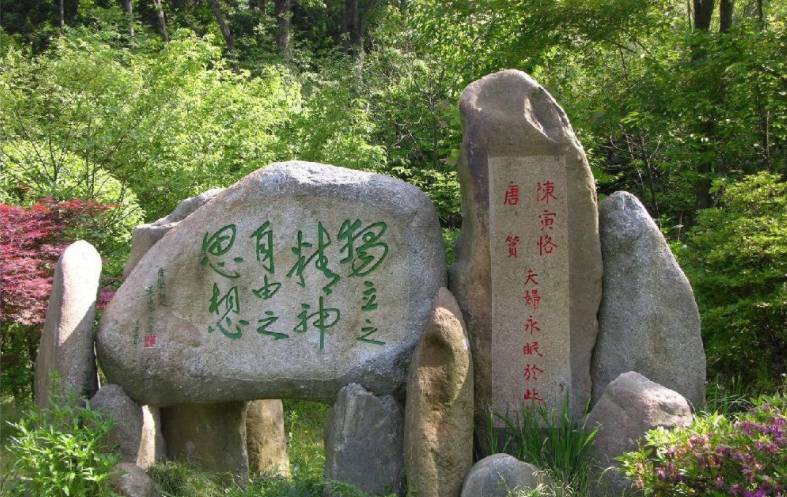
***
Xu Zhangrun’s criticisms of the Xi Jinping era began long before he published his famous July 2018 jeremiad; and he has long been aware of the price he would eventually have to pay for his daring. In the introduction to a volume of his essays published in 2016, Xu wrote:
My youth was spent in poverty and hunger; it was a time when silence reigned supreme and society was fearful even of private exchanges. We lived in trembling fear and it was only in my middle years that I no longer had to worry about everyday essentials.
I have witnessed the changing seasons: the gradual passing of winter and the promise of spring; as well as the taste of bitterness as it gives way to sweet possibility, new hope flickered alive in dead embers. There was no telling that as events unfolded, for the truth still lay buried under the surface; there was backtracking aplenty and always the possibility of a dramatic political reversal. So I was still fearful in my heart. Untrammeled sleep has always eluded me, invariably I have found myself lost in thought even at the midnight hour and the urge to express myself was never far away.
筆者半生已過,從少幼溫飽不繼,寒蟬僵鳥,道路以目,觳觫存世,到中年衣食無憂,眼見這方水土冬去春回,苦盡甘來,寒灰更然,卻不料,時勢遷轉,尚未水落石出,抑或有所迂迴,彷彿岸谷之變,故而依舊心存危懼。危懼寸心,遂寢食難安,午夜沈吟,總想傾述。
I was convinced that no matter what punishment may eventually be visited upon me, I would surely have the right to raise my voice in baleful protest. To the end of my days I will be here in this land, subject both to its bitter cruelties and enjoying its embracing charms, its successful advances as well as its retreats. Our lives are all bound up with it, and so too it will effect the myriad of generations to come. There is nowhere we can flee from this fate and it is impossible to turn a blind eye to our reality.
We may enjoy lives of boundless possibility, but only if we speak out. After all, people are voluble creatures and you’ll shrivel up and die if you’re forced to hold your tongue. I am just an insignificant teacher, someone for whom talking is their stock in trade. So, I must have my say and I will speak out until I have given voice to everything that I feel I must. And I will say it all clearly; I will speak up so that everyone can hear me — for this is both my profession and my duty.
至少覺得,若遭刑戮,也有張口喊痛的權利。此生有盡,既棲息此方水土,則其冷暖榮枯,關係身家性命,影響千秋萬代,無法逃避,不可能假裝看不見,則人生無盡,有話說話,人是說話的動物,不說會憋死,身為一介教書匠,說話,把該說的話說出來,說清楚,說給大家聽,蔚為天職。
However, friend, if you are one whose mouth is always filled with paeans of praise, you have no real regard for this land and its fate. You are nothing more than a transient grifter. Behind all of that sound and fury you are nothing but a sham. How could you expect me to have any respect for you?
是呀,若果你口中總是贊美詩,可並非與這塊土地生死相連,不過暫居撈金,而振振有辭,裝神弄鬼,朋友,你讓我怎麼敬服你呢?!
After all, we all confront the need to cultivate ourselves even as we are dwarfed by the dark mountains [of human existence]. Nothing for it but to live, strive.
而且,化性起伪,怀山襄陵,我们怎么活呢?
— from ‘Introduction to a New Edition’
許章潤,《國家理性與優良政體》
香港城市大學出版社, May 2016
***
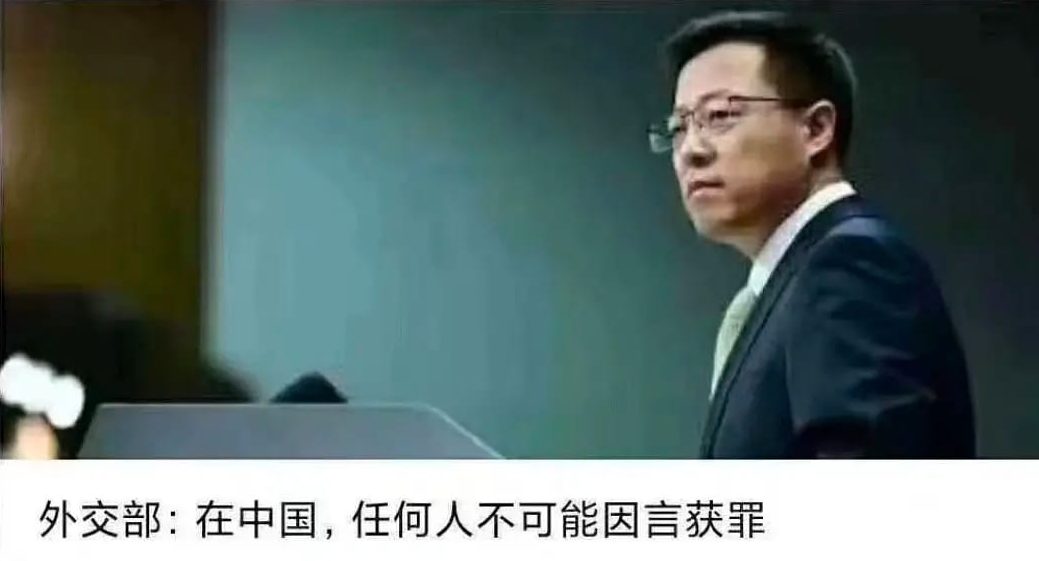
***
The defense of academic freedom in China today — one spearheaded by Xu Zhangrun over the past three years — recalls that stele on the Tsinghua campus, just as those who support Xu repeatedly quote that epitaph written for Wang Guowei ninety years ago:
‘The future cannot be known; indeed there may come a time when this Gentleman’s work no longer enjoys preeminence, just as there are aspects of his scholarship that invite disputation. Yet his was an Independent Spirit and his a Mind Unfettered — these will survive the millennia to share the longevity of Heaven and Earth, shining for eternity as do the Sun, the Moon and the very Stars themselves.’
The plangent fate of Xu Zhangrun, one of China’s new Former People, reflects the tragic reality that the lights of independent thought and the free spirit have long been on the wane in China. For two long years Tsinghua University has given license to, as well as enacted, a shameful ‘death by a thousand cuts’ 千刀萬剮 of a paragon. Xu Zhangrun will live on in Chinese history and letters as a giant in the company of Wang Guowei and Chen Yinque while his tormentors will be consigned to infamy.
For those who now choose to continue collaborating with Tsinghua University, be they in China or at international academic institutions, a stark choice looms, one between the convenience of mutual benefit on the one hand and the challenge posed by intellectual probity on the other. Xu Zhangrun chose moral clarity and in doing so he rejected the acquiescence of silence.
***
The brazen bell is smashed and discarded;
The earthen crock is thunderously sounded
黃鐘譭棄,瓦釜雷鳴
‘Is it better to risk one’s life by speaking truthfully and without concealment, or to save one’s skin by following the whims of the wealthy and highly placed?
‘Is it better to preserve one’s integrity by means of a lofty detachment, or to wait on a king’s mistress with flattery, fawning, and strained, smirking laughter?
‘Is it better to be honest and incorruptible and to keep oneself pure, or to be accommodating and slippery, to be compliant as lard or leather?
‘Is it better to have the aspiring spirit of a thousand li stallion, or to drift this way and that like a duck on water, saving oneself by rising and falling with the waves?
‘Is it better to run neck and neck with the swiftest, or to follow in the footsteps of a broken hack?
‘Is it better to match wing-tips with the flying swan, or to dispute for scraps with chicken and ducks?
‘Of these, alternatives, which is auspicious and which is ill-omened? which is to be avoided and which is to be followed?’
— from ‘Divination’ 卜居, attributed to Qu Yuan 屈原
trans. David Hawkes, Songs of the South, pp.204-205
***
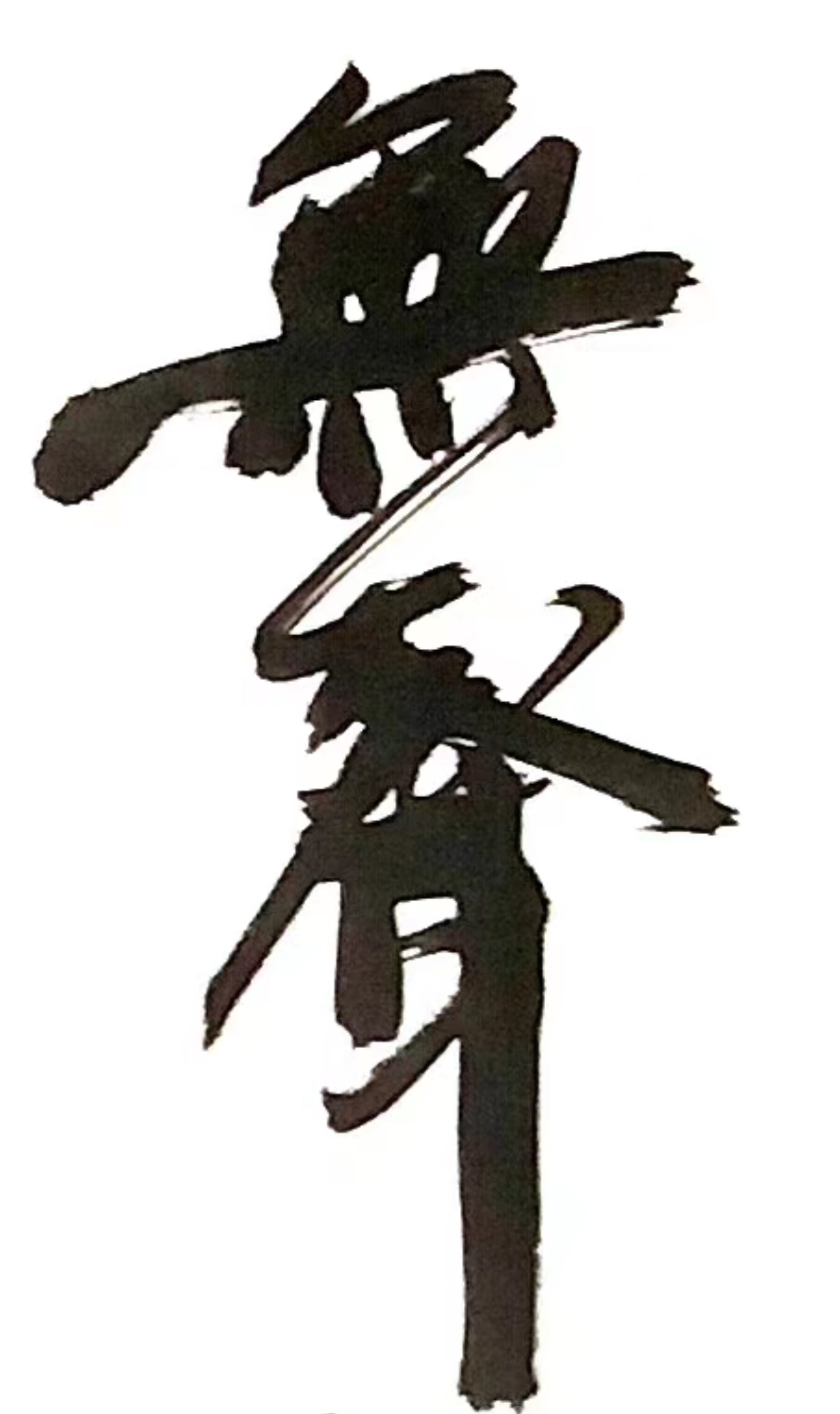
***
Erewhon Studio 無齋
From 2016, Xu Zhangrun wrote most of his most pointed work in his ‘Erewhon Studio’ 無齋 at Tsinghua University in Beijing. The name 無齋 wú zhāi literally means ‘The Studio That Isn’t’. I translate it as ‘Erewhon’, a reference to the title of a novel by Samuel Butler published in 1872. A satire of Victorian social mores, the book was about ‘nowhere in particular’, ‘erewhon’ being a reverse working of the word ‘nowhere’. Butler’s fictional ruminations are thought to have been inspired in part by his time in New Zealand.
The name ‘Erewhon Studio’ thus links Xu Zhangrun’s prose, with its satirical undertow and utopian aspiration, and New Zealand, a distant island nation where China Heritage is produced.
Of course, Xu Zhangrun’s essays, created ‘no-where’, are really about ‘now-here’.
Since being cashiered by Tsinghua University in early July 2020, and ejected from the Tsinghua campus, Professor Xu’s Erewhon Studio has migrated to his humble apartment some forty kilometres to the west.

